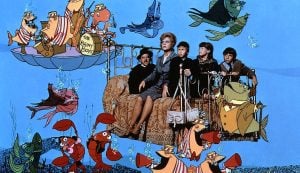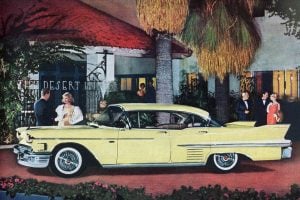No is a two-letter word
by Robert Paul Smith
A parent and an interested observer of children, Mr Smith is the author of “Where Did You Go?” “Out.” “What Did You Do?” “Nothing.” — that runaway bestseller about the kids of today as compared with the kids of yesterday. In this article, Mr Smith discusses one of today’s biggest problems, juvenile delinquency, and reveals a logical method of coping with it.

Stop calling it juvenile delinquency
It would seem very presumptuous of me to write a piece about juvenile delinquency, since I am in no sense an expert on the subject, were it not evident that the experts are in disagreement about it in the first place, and their methods, they tell us, are failing in the second place.
So, since it’s open season: the first thing, I suggest, would be to stop calling it juvenile delinquency. We Americans have long been victims of the theory that calling a thing by another name does in fact make it smell sweeter. I submit that what is going on now is crime. Whether there is more or less of it than before is a problem for the statisticians, but Lord knows there’s more than enough of it.
It would seem to me that murder or homicide or manslaughter or robbery is the same act, whether it’s committed by a sixteen-year-old or a sixty-year-old, and I’m afraid I think it must be dealt with in the same way. As a principle, if a kid is old enough to carry and stick a knife in someone until the someone is dead, he must bear the responsibility of his act.
Whether or not what the law does to such a person is right or wrong, I don’t know nor does anyone, but the age of the person does not seem to me to alter the nature of the crime. Perhaps we need a tremendous overhaul of our penal system, and if we find a useful way to reduce the amount of adult crime, we will at the same time find the way to reduce crime committed by juveniles.
But as a citizen of the republic, I would be as loath to have a shiv stuck in me by a beardless youth as by a mature man, and at the moment, if someone is going around ready, willing and able to use a thirty-eight, for money or kicks, I want him on the other side of the bars from me.
Kids today & kids yesterday
When I was a kid, we had the same desire to loot and pillage and rape as these kids today, we were as savage as kids always are, but at the same time we knew that our parents and all other grownups were unalterably opposed to it, and we didn’t do it.
When we stole, and we stole, it was understood by us that if we were caught, the following events would happen in strict and immutable succession. The storekeeper would call a cop. The cop would take us to the police station.
After some time, our father would come to the police station. When he appeared, he would talk, not to us, but to the police. If there was legal action, it would be taken, and our father would be as obedient to the law as anyone else. If there was no legal action, it was his problem.
MORE: Booklet: New facts about marijuana (1970)
Depending on what kind of father we had, we would be licked, or we would get no allowance for the next thirty years, or we would not be taken to the amusement park or get the air rifle, or be allowed out on the street after supper. No matter which of these things the father did, one thing was certain and, oddly enough, this was the crux of the matter. He would be angry at us and ashamed, and truly, that was the punishment.
Learning to abide by the law
I am not saying that the above is what actually happened; in my particular gang, the thefts were minor, and we were never caught, but the foregoing at the police station is what we not thought, but knew, would happen.
Whether it is in fact what would have happened is no matter. We were sure it would happen, and that was enough. We were sure it would happen because that was the law, and we knew our fathers would not try to get us off, because our fathers were law-abiding.
My point is simple: We were law-abiding citizens because our parents were.
 It is now a television comic’s joke, “Twenty years for hitting a man with glasses.”
It is now a television comic’s joke, “Twenty years for hitting a man with glasses.”
When I was a kid, it was true, it meant what it said. We knew for a fact and, once again, it is not important whether or not it is a fact, hit a guy with glasses and it’s twenty years in the clink.
I don’t care how soppy it sounds, but it was the fact that our parents would be angry and ashamed that made us ashamed to do anything really bad. And oddly enough, the parental authority being what it was, it extended to every area of your life. Sure, we thought some of our teachers were fools, and it is highly likely that we were right, and sure, some of them were mean and some we hated with a hate that I now reserve for creatures like John Kasper. We gave a lot of them the dumb treatment, on occasions we rose to give them some lip, lying on a grassy slope after school smoking forbidden cigarettes, we talked about them and plotted assassination, torture, bloody red riot.
But it was inconceivable to us that we would, in life, hit them. It was as inconceivable as that we would hit our old man. That, in my middle-class life, was inconceivable, and so it was with all the kids I knew. Hate, yes. Hit, no.
Tools to keep the peace
One summer I got a job in a summer camp as a counselor. In the camps I had gone to as a kid camper, if you got out of line, you got smacked, or you were docked desserts, or swimming. I assumed I could use these same tactics as a counselor.
MORE: Survey: What’s happening to the American family? (1972)
The head of the camp blandly asserted that none of these tactics was allowed to us, that the kids had paid for their desserts and would eat them, had come to camp to swim and would swim; and as for hitting, well, you hardly sent a kid to strangers to be hit.
We protested, we counselors, how, then, could we keep the kids in line? The director looked at us blandly and with a certain amount of scorn. “If a bunch of big hulks like you can’t make an eight-year-old kid do what you want him to…” That was all. I cannot tell you how we kept order, but we did. We willed it, and it happened.
Regularly stepping out of line
It seems to me that the problem of juvenile crime grows from the fact that once a kid has stepped out of line enough to be in trouble with the law, he has stepped out of line, many times before, enough to be in trouble with his pa. If a cop has to teach you, it’s because your old man hasn’t.
I think kids are juvenile criminals because their parents, for whatever reason, poverty, ignorance, selfishness, immaturity, irresponsibility, are willing for them to be juvenile criminals.
Certainly, the more society occupies the parents in tiring, deadening, stupid, ill-paid jobs, the more the kids live in dirty crowded apartments on poor streets, in a word, the longer there are poor parents and poor kids, the longer these kids will be the major source of supply of young criminals.
But I have reason to believe and evidence to produce, living in a very well-heeled suburban community, that poverty is far from the whole explanation.

Parent your children
I see kids riding down the streets of my town, much too fast, in large shiny new convertibles, and I know where they got those cars from: From parents who either believe it proper for irresponsible kids to own and operate lethal weapons, or parents who are as stupid about driving cars as their kids, or, and it is, I believe, the most common situation, from parents who sit on their patios wringing their hands and saying, “I just don’t know what to do about Johnny.”
I know what to do about Johnny. Tell him he can’t have the keys to the car. Or they are moaning about Susan, who goes riding in one of these cars with someone else’s Johnny. “Whatever are we going to do about that girl?” Why, tell her she can’t ride in the car.
MORE: Kids on drugs: They’re children you know. Maybe your own. (1970)
I see the kids in the black leather jackets, and I’m scared of them. I think they would just as lief stomp me as hook a pack of chewing gum, but I’m pretty scared of the kids in Bermuda shorts who take a car around the corner that fast specifically to hear the tires squeal. I think they’d just as soon hit me as get another Presley record.
But the ones I want to get to are the parents who let the kids get that far.
The only suggestion I have to make is that we stop yammering about how rotten the kids are, and start considering how deficient our adult society is.
These kids are in trouble because nobody, really, gives a damn about them. They are not, I believe, in conflict with society. They are an awkward, gangling, terrifying picture, in all the exaggeration of youth, of what our society is. They are all of us seen in a funhouse mirror.
What to do about them? The same as there’s always been to do about anything.
Be better.



















